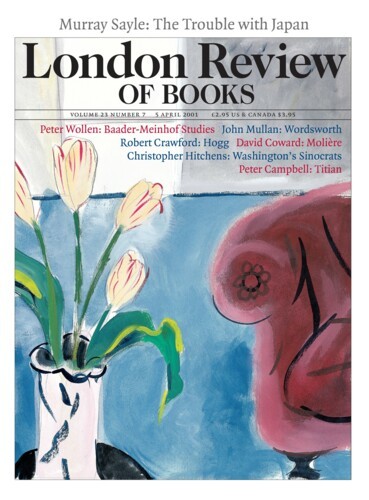‘Sounding off’ in the column of that name in last Sunday’s Observer (we go to press on 22 March), Melvyn Bragg – novelist, broadcaster, Controller of Arts Programmes at LWT, President of the National Campaign for the Arts, Labour peer and otherwise big-haired all-rounder – lavished praise on Chris Smith. He ended with an anecdote about
a meeting in the Cabinet Room at No. 10 the other week. The Prime Minister and Chris Smith had shepherded together a score or so of us from the arts world . . . A strange sound was heard . . . The Arts Minister was being praised.
By ‘Arts Minister’ he presumably means Chris Smith, the Secretary of State for Culture, Media and Sport, rather than Alan Howarth, the Arts Minister and ex-Tory, but you can hardly blame Lord Bragg for his confusion: when Smith took over the post from Virginia Bottomley in May 1997, he was officially in charge of National Heritage, a department which had subsumed the Arts after the 1992 election. In the old days – who can forget Colin Moynihan? – Sport was a sub-directory of Education, and Media was nowhere. And just to complicate things further, the Commons Media Select Committee, chaired by Gerald Kaufman, one-time Booker Prize judge and unlikely star of the LRB’s personal ads, has now recommended scrapping Smith’s ministry and replacing it with ‘a broader department of communications’. It must be easy even for an active member of the House of Lords like Bragg to get lost in such labyrinthine corridors of bureaucracy – sorry, power – though he seemed to find his way to the Cabinet Room all right.
One reason for His Lordship’s fulsome endorsement of Chris Smith may have been that the day before his article appeared, the Secretary of State was in Bragg’s native Cumbria, meeting representatives of the tourist industry who are facing ruin because of the foot and mouth epidemic. He was actually there to give the Wordsworth Memorial Lecture, but since Janet Anderson, the Minister for Tourism (at least I think that’s what she is; the Guardian recently referred to her as the ‘Creative Industries Minister’), was in the West Country and not even Government ministers can be in two places at once, Smith nobly shouldered her burden in the North-West.
The crisis in the countryside has rather overshadowed Smith’s good news for the month. His triumphant ‘Creative Industries Mapping Document’ revealed that advertising, architecture, the arts and antiques market, crafts, design, designer fashion, film and video, interactive leisure software, music, performing arts, publishing, software, TV and radio generate £112.5 billion of revenue a year (5 per cent of GDP), export earnings worth £10.3 billion, and employment for 1.3 million people. Smith explained why creativity is important: ‘an essential ingredient for success’, it ‘will bring a key commercial advantage’ to businesses in 21st-century economies. The new Creative Industries Higher Education Forum is an advisory committee intended to strengthen links between universities and creative industries. David Eastwood, chief executive of the Arts and Humanities Research Board, said: ‘Arts and humanities research has a positive contribution to make in the creative sector’ – but what about the other way round? Eastwood also endorsed ‘the emphasis on skilling students’, looking ahead to the day when David Blunkett’s ministry is renamed the Department for Skillation and Employment.
Kaufman’s recommendation for replacing the DCMS with a whole new department of communications may prove to be a little previous. Smith has published a Communications White Paper in collaboration with Stephen Byers, and a determined pessimist might wonder, after reading the ‘Mapping Document’, whether Smith isn’t already an under-secretary in the DTI in all but name. But then, as Lord Bragg says, ‘something in the present culture likes to smell a rat or at least to spot one. It is as if today we distrust the possibility that we are good where once, not many decades ago, we dismissed the possibility that we could be bad.’ And why bother fretting about such slippery qualities as ‘good’ and ‘bad’ in the arts, when you can focus on something concrete, like £112.5 billion?
Send Letters To:
The Editor
London Review of Books,
28 Little Russell Street
London, WC1A 2HN
letters@lrb.co.uk
Please include name, address, and a telephone number.

